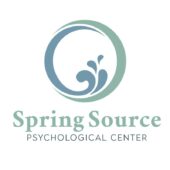
Anxiety therapists in Elko, Nevada NV

Dr. Amanda Roberts
Psychologist, PhD Clinical Psychology, Masters in Marriage Family Therapy
Working with anxiety disorders requires a comprehensive knowledge of the biological, psychological and learned basis of these complex conditions and finding creative ways to navigate through them to obtain lasting relief.
SpringSource Psychological Center, PLLC
Psychologist
SpringSource Psychological Center was founded by two Ph.D., licensed clinical psychologists Dr. Susan McClanahan and Dr. Angela Derrick, as a collaborative practice to help individuals heal from eating disorders, depression, anxiety, trauma, relationship concerns, and life stressors such as pregnancy and infertility.
Cait Glenn
Licensed Clinical Social Worker, LCSW
My specialty is working with individuals with anxiety as well we those who are struggling with life transitions that are causing stress or difficulty. We all experience anxiety and struggle throughout our lives and sometimes need a bit of support navigating how to feel our best again.
Las Vegas Hypnosis Center
Hypnotherapist, Certified Hypnotherapist, NLP Master Practitioner & Life Coach With Over 24 Years Experience.
In order to obtain, sustain, and maintain greater emotional balance, including relieving the emotions of Anxiety & Fear, it's important to learn the Simply & Practical NeuroScience of how the human brain works, and even more importantly, it's important to learn Simple, Fast Working Techniques to balance out our emotions.
With the use of Fast Working Hypnosis & Coaching Techniques, you will be feeling better even during our very first session together.
To find out more, you can either call me for a Free Hypnosis Discover Session at 702-626-4901 or you can schedule a time online at: https://calendly.com/lasvegashypnosiscenter/free-hypnosis-strategy-session
Jayson L. Mystkowski
Psychologist, Ph.D., ABPP
While Cognitive-Behavior Therapy (CBT) is highly effective in the treatment of anxiety disorders (e.g., Panic Disorder, Social Phobia, and Obsessive-Compulsive Disorder), clinicians do see some “return of fear,” or partial relapse, in some patients due to a variety of factors. Over the past two decades, treatment researchers, with whom Dr. Jayson Mystkowski had the pleasure of working with at UCLA for over 10 years, have studied “return of fear” and discovered some key variables that may optimize the effects of learning during CBT for anxiety disorders (Craske et al., 2008).
First, evidence suggests that focusing on tolerating fear versus eliminating fear yields better clinical outcomes in the long term. Namely, teaching clients that fear and anxiety are normal feelings, rather than attempting to “down-regulate” such feelings all the time, is more realistic and seems to engender “hardier” clients. Second, helping clients to generate an expectancy that “scary things will not happen,” is very powerful. To do this, it is important for clinicians to create more complex exposure exercises (i.e., tasks in which a client confronts a stimulus of which they are afraid), using multiple feared stimuli instead of one at a time. Then, the lack of a feared outcome becomes particularly surprising and memorable for a client and fear reduction is more potent. Third, increasing the accessibility and retrievability of non-fear memories learned during treatment are powerful factors in mitigating against a return of fear. Craske and colleagues demonstrated that exposure to variations of a feared stimulus, using a random schedule across multiple contexts or situations, is more effective than exposure to the same stimulus, on a predictable schedule, in an unchanging environment. The former paradigm, it is argued, creates stronger non-fear memories that are easier for a client to access when subsequently confronting feared objects or situations outside of the therapy context, than the later scenario.
In sum, clinicians have long been aware that some fear or anxiety returns following very successful CBT treatment. As mentioned above, there are some clear, empirically supported ways to modify the therapy we provide to further help clients generalize the gains made in therapy sessions to the real world.





